June 10, 2015 | 20th Anniversary Conference
Women Leaders Tackling 21st Century Challenges
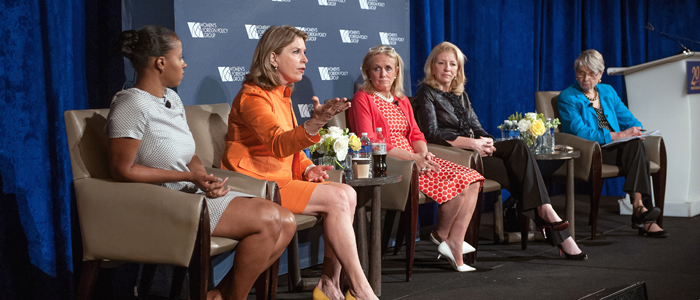
Washington, DC—The panel on Women in Charge: How They Are Changing Politics, Government, and Corporate America covered the importance of women’s leadership across public and private sectors, the role that men can play in advancing women’s rights, and the role of social media in elevating the voices of young women. The speakers included Ambassador-at-Large for Global Women's Issues Catherine Russell who gave the opening remarks, Representative Debbie Dingell (D-MI), Former Chief Global Communications and Public Affairs Officer for Marriott International and Congressional C-andidate Kathleen Matthews, and UN Global Education First Initiative Youth Advocacy Group Co-Chair and Amnesty International USA Senior Campaigner Jamira Burley. The discussion was moderated by Daily Beast Political Writer and McLaughlin Group Panelist Eleanor Clift.
Russell addressed the audience and emphasized how powerful young women can be if they are empowered and given the tools to succeed. She praised the President and First Lady’s initiative “Let Girls Learn” that was launched earlier this year to help adolescent girls attend secondary school, but added that the government cannot achieve this goal alone and so everyone, including men, must work together to help empower girls. She noted that in order to achieve progress, men must also be included in the conversation about gender equality and female empowerment.
Clift asked each of the panelists to reflect on where they were 20 years ago and if they thought they would be where they are today, and then to project into the future and think about where they will be in their careers in the coming decades. Representative Dingell was working at General Motors and was sure she would end her career there as a senior executive. She said she never would have imagined she would be a member of congress, and added that there ought to be more women in congress because women have a different perspective on many issues than men. Matthews stated that 20 years ago she was working as a news reporter at ABC7, WJLA-TV where she hosted a syndicated program called “Working Woman” and reported on women-focused news. Like Dingell, Matthews also believed she would end her career as a journalist. However, she eventually transitioned into corporate America with a job at Marriott International and is now running for congress. Ambassador Russell explained that 20 years ago she was the associate deputy attorney general. Prior to this, however, she worked for then-Senator Biden on Capitol Hill during the time he introduced the Violence Against Women Act. Although she had not pictured herself working on women’s issue, later in her career she focused on gender-based violence on an international scale and continues to work on this issue in her role at the State Department. 20 years ago, Burley was still in elementary school, but she explained that it was at this time that she was becoming aware of the socio-economic factors faced by her family and other families in her Philadelphia neighborhood. When she was still young, her brother was shot and killed, and it was this event that launched her into activism against gun violence.
The speakers addressed the importance of including women in the workforce and the economy. Ambassador Russell stressed while it is true that many women are victims of violence, they have a tremendous capacity to be agents of change in their communities. She believes that while empowering women is beneficial to them and their families, it also makes their country more prosperous and stable. In her opening remarks, Matthews used statistics to demonstrate this: If women’s labor force participation rose to comparable male levels, GDP would rise by 5% in the United States, by 9% in Japan, and by 34% in Egypt.
The panel also covered the role of women in the private sector and Mathews and Dingell shared their personal experiences. Matthews talked about the importance of having multiple women on corporate boards, noting that if you only have one woman on a board, she does not speak out because she does not want to “rock the boat.” If you have two, they are waiting for the other one to speak and it is a standoff. She argues that when you have three women on a corporate board, it is a critical mass that, according to research, has been shown to help companies perform better. She also noted that while Marriott is known for its “diversity and inclusion,” she would go to award ceremonies and no women would win awards because they had not filtered up the ranks and did not own or manage hotels. Dingell spoke about the sexism present in many industries, including the auto industry, and how when she was younger and interviewing to work at General Motors, they asked her why a woman would want to work there.
Several of the panelists stressed the importance of educating girls, not just in the United States, but all over the world. Burley, who was the first person in her family to graduate high school, articulated a dire need for education so that girls are able to “adequately provide and engage in society.” Russell echoed this sentiment, pointing out that in many places in the world girls do not get a secondary education and they are instead married off, have to take care of children, or sent to work in the fields. She applauded the President’s focus on this issue and his determination to close the gender gap in education. By not giving girls the opportunity to get a secondary education, she added, we are cutting off “endless sources of strength and potential.”
Clift also asked the panelists how we can empower women without disempowering men. Russell replied that empowerment is not a zero-sum game and that empowering women is not a detriment to men, but rather an advantage. Empowering women strengthens communities and countries and this in turn benefits everyone in those communities, including men. Burley added that “true liberation has to liberate that entire community” and this is achieved through the collaboration of both men and women.
The panel also discussed social media’s role in foreign policy and its advantages and disadvantages. Russell pointed out that one of the problems with social media is that it is being used by terrorist organizations such as ISIS to recruit people all over the world, including women. She suggested that the State Department must adjust and use more social media to combat this issue by informing women being recruited that although these groups may promise you that you will be a part of a great mission and be a “wonderful bride,” you will actually be entering into a life of slavery. Burley, however, spoke about some of the benefits of social media, citing the website she cofounded, GenYNot, as an example of the ways social media can impact young people in positive ways.
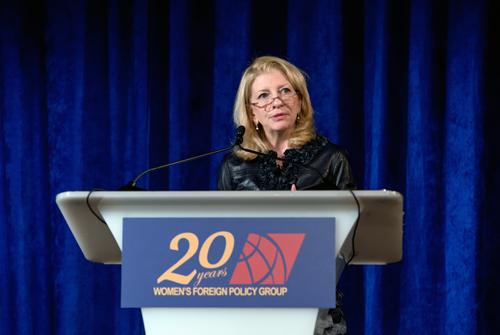 |
 |
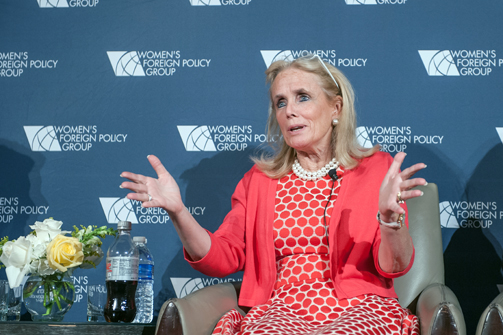 |
Ambassador-at-Large for Global Women's Issues
Catherine Russell gives opening remarks
|
|
Representative Debbie Dingell (D-MI)
|
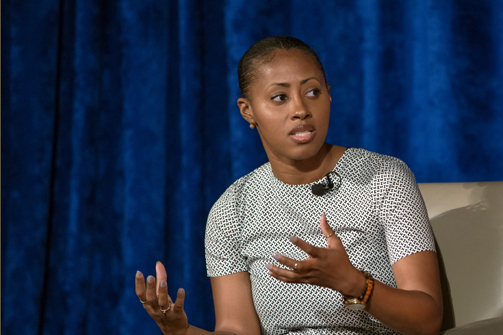 |
 |
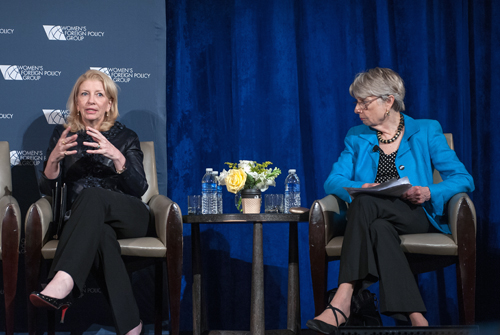 |
Jamira Burley, UN Global Education
First Initiative Youth Advocacy Group Co-Chair
and Amnesty International USA Senior Campaigner
|
|
Ambassador Catherine Russell and moderator
Eleanor Clift, Daily Beast political writer and
McLaughlin Group panelist
|
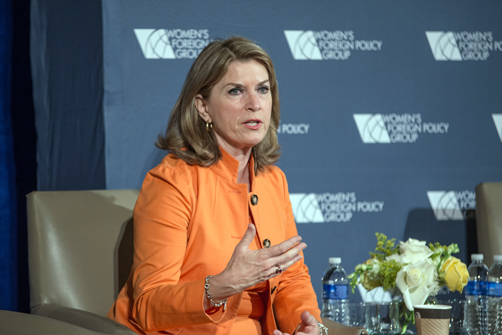 |
 |
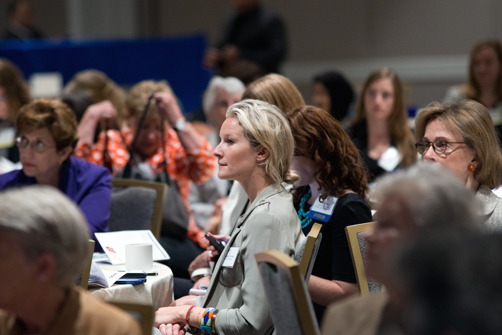 |
Kathleen Matthews, Former Chief Global Communications
& Public Affairs Officer of Marriott International
|
|
Caroline Chewning of United Technologies during the panel
|
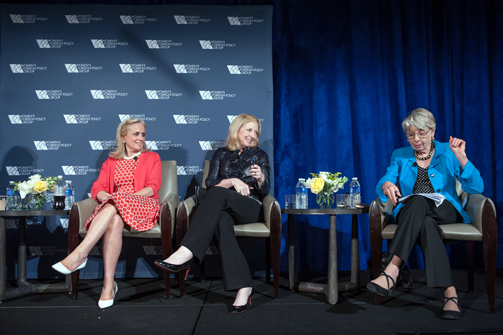 |
 |
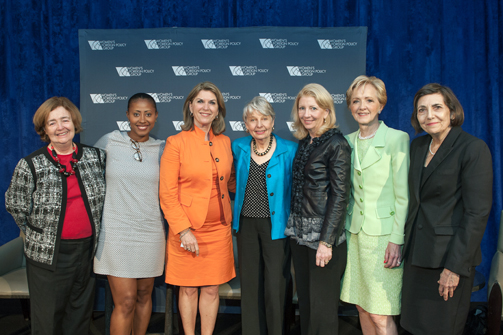 |
Eleanor Clift moderates the discussion with
Representative Debbie Dingell and
Ambassador Catherine Russell
|
|
Dawn Calabia, Ann Stock, and Patricia Ellis
with speakers and panelists
|
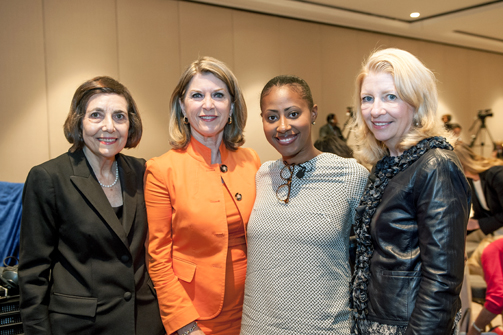 |
 |
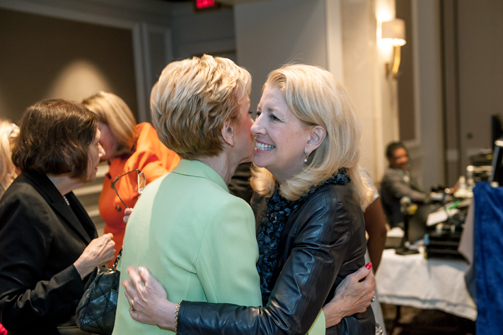 |
Patricia Ellis, Kathleen Matthews, Jamira Burley,
and Ambassador Russell
|
|
WFPG Board Chair Ann Stock greets Ambassador Russell
|
|
|